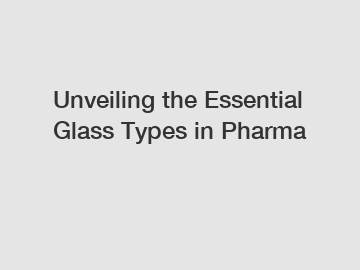Unveiling the Essential Glass Types in Pharma
In the realm of pharmaceuticals, every tiny detail matters when it comes to ensuring the safety and efficacy of life-saving medications. A crucial yet often overlooked aspect of this intricate process lies in the glass types used to contain these drugs. The choice of glass can significantly impact the stability, durability, and overall quality of pharmaceutical products.
In this blog, we delve into the world of glass and explore the essential glass types utilized in the pharma industry. As we navigate through this informational journey, we aim to shed light on the critical role that specific glass compositions play in preserving the viability of medications, enhancing patient safety, and fostering innovative pharmaceutical advancements.
1. Borosilicate Glass:

At the heart of the pharma industry is the robust and versatile borosilicate glass. Demonstrating exceptional resistance to thermal shock, it is the go-to choice for the manufacturing of ampoules, vials, and syringes. Its low reactivity with drug compounds ensures the integrity and purity of pharmaceutical products, safeguarding them from contamination and degradation. With a track record of proven stability, borosilicate glass has earned its reputation as an essential glass type in pharmaceutical packaging.
2. Type I Glass:
When precision matters most, Type I glass emerges as a top contender. Composed of chemically resistant borosilicate, it boasts high hydrolytic resistance, rendering it ideal for storing sensitive drugs. Type I glass containers effectively withstand aggressive substances, protecting medications from exposure to potentially harmful elements. Additionally, they offer excellent transparency, allowing healthcare professionals to visually inspect the contents with ease, ensuring the integrity of the containers.
3. Soda-Lime Glass:
For non-parenteral drug products, soda-lime glass takes the spotlight. Its cost-effectiveness and widespread availability make it a practical choice for packaging solutions such as oral medications. Though less resistant to chemical corrosion and thermal shock compared to borosilicate glass, soda-lime glass provides satisfactory protection against external factors that could compromise drug stability. By striking a balance between functionality and affordability, soda-lime glass continues to play a significant role in the pharmaceutical industry.
4. Amber Glass:
Navigating the challenge of light-sensitive medications, amber glass emerges as a trusted ally. With its distinct amber hue, this glass type acts as a shield against ultraviolet and visible light, protecting pharmaceutical products from light-induced degradation. Its exceptional light-blocking capabilities make it an indispensable choice for the packaging of drugs that are susceptible to deterioration caused by light exposure. The pharmaceutical world relies on amber glass to ensure the potency and efficacy of these delicate medications.
Conclusion:
As we unveil the essential glass types in pharma, it becomes evident that glass plays a critical role in preserving and protecting life-saving medications. The choice of glass is not merely superficial but a meticulous process driven by the need for utmost efficiency, safety, and stability in pharmaceutical packaging. From the versatile borosilicate glass to the light-shielding amber glass, each type offers unique benefits tailored to specific drug requirements.
Amidst the advancement of modern pharmaceutical technology, glass packaging remains an irreplaceable cornerstone. The industry continues to innovate with glass advancements, exploring new compositions and technologies to further enhance drug storage and delivery systems. As patients' lives depend on the integrity of these medications, the unwavering commitment to selecting the most suitable glass type in pharmaceutical packaging remains a crucial aspect of drug safety and efficacy.
Remember, when it comes to pharmaceuticals, the story of glass is not an afterthought; it is an essential chapter that ensures our medications reach us in their optimal state, ready to restore health and save lives.
Are you interested in learning more about types of glass ampoules, glass ampoules for sale, what is tubular glass vials manufacturing process? Contact us today to secure an expert consultation!


